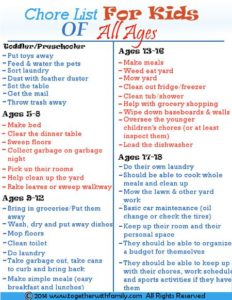
Many parents do everything for their kids. And I mean everything. We may think we are being supportive and kind to them by doing all of their laundry, cleaning up after dinner, making their bed, and taking care of their pets- but we are actually doing them a huge disservice. They learn valuable skills by doing chores and a sense of responsibility within the family unit. Feeling like you are big part of the success of your family team builds self worth and a sense of belonging.
Chores for all ages:
It is important that everyone in the family has chores to do. Even the littlest of kids can help out. Chores help with self esteem, responsibility, delayed gratification, and learning to cope with frustration. The Together With Family blog has a great chart for chores for all ages. You can also check out the blog here: http://togetherwithfamily.com/
It is really up to you as the parent to determine what chores would be good for your child’s developmental level. You want to challenge them, but you also want them to be successful at it.

How to Make a Chore Culture Work:
– Make it a norm for the family. If you start young, doing chores is just a normal part of being in the family unit. If you haven’t started when they are young- make sure that everyone in the family has chores and that everyone has to help. Make sure you keep the chores in the age appropriate bracket because you want your kids to be successful at it in order to build pride and self worth.
– Hold them to their responsibilities. Everyone needs to complete their chores in order to do the fun things in life. Try to make it fun to complete chores and even help them (as long as they are helping as well). Try to find out why they don’t want to do a certain chore and find other tasks that they are more interested in or would benefit from learning those skills.
– Change up chores every so often. It gets boring doing the same things over and over. So make sure to change it up every once in awhile so that it gets the mind moving again and so that everyone can learn skills for all the different chores. If someone doesn’t want to change because they love doing the dishes (there are people out there), try giving them a buddy or trainee that they can teach their amazing dish washing skills too.

Allowance or no allowance.
Here is the big debate- should you pay your kids for the chores they do or is it just expected? This is completely different for every home and your kids. So in short: Do what is best for your family. If you want some extra resources the book, “The Opposite of Spoiled” by: Ron Lieber is a good choice.
In our home, we are communal. Meaning- we all do a little bit with no pay because that is how our household works. I’m not saying it’s perfect for everyone, but it works at our house. (Plus my kids are too little to want money).
FAILURE IS GOOD!
It is better to learn about consequences at a young age, where natural consequences are minimal. As an adult natural consequences can be a huge set back. You need to expect your kids to fail and to get consequences for that failure. It is a learning experience and you learn when you fail. If you are perfect the whole time, you are nervous to fail. We need to learn how to fail and then bounce back. This is a vital skill that will be crucial to their adult life success.

Why a Chore Culture is important.
-Value what we have.
-Know where our food/supplies comes from.
-Gain practical skills/prepare for life.
-Understand our value/gain self confidence.
-Get the feeling of being a valued part of the family.
My Challenge to you: It is time we all review our chores and family member expectations. Try to implement the pieces of a ‘Chore Culture’ that you think will work best for your family. Remember that everyone is an important part of the family and can contribute.
Happy spring cleaning friends!
-Jessie the Therapist



